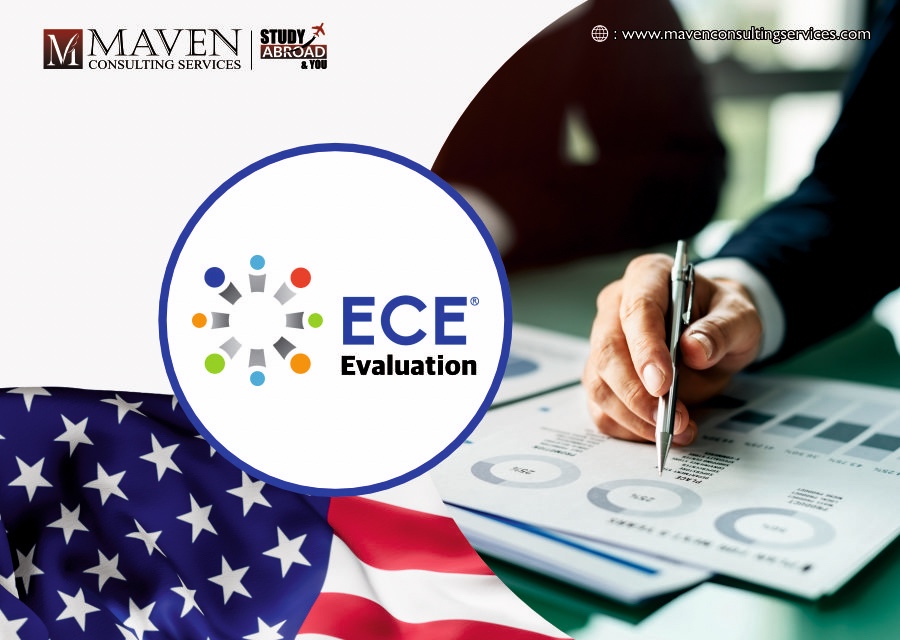WhatsAppCHAT
CALL US& CONNECT

Foreign applicants acquiring opportunities in the United States have to go through an umpty number of processes, one of which is the ECE (EDUCATIONAL CREDENTIAL EVALUATORS) evaluation.
People from other countries often have different grading systems, making it challenging for American schools or employers to assess the quality of their grades accurately.
ECE helps by translating their grades into a system that Americans understand, like a 4.0 scale. This is accomplished through a third-party organization authorized by American institutions, known as Educational Credential Evaluators (ECE).
Educational Credential Evaluators (ECE), a nonprofit organization specializing in converting overseas academic records into U.S. format, is one of the most well-known and reliable suppliers of these assessments.
ECE is also accepted by some Canadian professional associations and educational institutions for the evaluation of international degrees, providing applicants considering multiple locations with additional options.
Because grading scales and credit systems differ across countries, an ECE report provides a consistent benchmark for applicants seeking study, work, or licensure in the US or for foreign degree evaluation in Canada when institutions accept ECE results.
Suppose you’re still exploring your study-abroad options. In that case, you can also read a guide on choosing to study abroad for insights on planning your education journey before beginning an ECE evaluation.
An ECE evaluation report explains exactly how an international credential aligns with US education. Depending on the service you choose, such as an ECE course-by-course evaluation, it may include:
The ECE course-by-course evaluation fee typically starts around US $110 to $244, with options to add digital badges or extra copies for a small additional charge.
This detailed report is often required for graduate programs, competitive scholarships, or professional licensing boards that need a complete record of subjects and credit values.
When applying to various universities and programs, it’s essential to understand the specific type of report each institution requires.
Whether you’re exclusively applying to the Advanced Standing International Dental Program or considering other graduate programs, the table below outlines the available options:
| ECE Report Types | Price (U.S.) | What It Includes |
|---|---|---|
| General | US$110 | Country of study, identifies foreign institution, dates of attendance, credentials received, and U.S. equivalency (does not include grades, course-by-course detail, or GPA). |
| General with ECE Insignia | US$155 | Everything in General, plus a digital badge/certificate you can share, with discounted report copies. |
| General with GPA | US$135 | Same as General, but adds grade average (GPA) |
| General with GPA + ECE Insignia | US$180 | General with GPA + digital badge/certificate + discounted copies |
| Course by Course | US$199 | Includes: country, institution, dates, credentials, U.S. equivalency, grade average (GPA), and course list for university-level credentials with credits & grades. Useful for when a detailed evaluation is required |
| Course by Course w/ ECE Insignia | US$244 | Same as Course by Course, plus a digital badge/certificate and discounted copies. |
It’s important to note that while the General and General with Grade Average reports offer a broader overview of your academic credentials, the Course-by-Course report provides a comprehensive breakdown of your coursework.
If you are applying for a graduate program in the United States, you may need to submit an ECE Course-by-Course report. It simplifies the application process by allowing you to apply to multiple programs with just one application. Below are the steps to apply:
GradCAS requires a Course-by-Course credential evaluation report. Before Applying:
After submitting your application and payment, arrange for your educational documents to be sent to ECE following the country-specific requirements.
An ECE evaluation is essential whenever a US institution, licensing authority, or employer verifies and compares foreign education to domestic standards.
Typical reasons include:
Completing an ECE exam early can save time and minimize application delays, as many colleges and licensing bodies accept them.
ECE (Educational Credential Evaluators) and WES (World Education Services) are frequently recommended as reliable options for evaluating academic credentials from other countries.
Both organizations are members of NACES and provide reports that are generally accepted by licensing boards, employers, and colleges in the United States.
There are, nevertheless, a few useful distinctions that can help you select the service that best suits your needs.
| Feature | Educational Credential Evaluators | World Education Services |
|---|---|---|
| Primary Focus | Evaluations for U.S. universities, licensing boards, and some Canadian institutions. | Evaluations for U.S. and Canadian universities and Canadian immigration (IRCC). |
| Typical Processing Time | About 5 business days after all documents are received. Rush service is available for an additional fee. | Standard 7 business days once all documents are received. Rush options are available for certain report types. |
| Report Types | General, General with GPA, Course-by-Course, and Insignia options with digital sharing. | Document-by-Document, Course-by-Course, and ICAP packages with electronic delivery to schools. |
| Pricing (approx.) | From US$110 (General) to US$199 (Course-by-Course). | From US $160 (Document-by-Document) to US $205 (Course-by-Course). |
| Best For | Applicants to U.S. graduate programs, professional licensing boards (engineering, healthcare, dentistry), or schools that specifically request ECE. | Applicants to Canadian immigration programs, universities in both the U.S. and Canada, or schools that specifically request WES. |
Tips for Successful ECE Assessment
Arrange Your Files: Make sure your ID, diplomas, and transcripts are ready to be sent to ECE.
In conclusion, Educational Credential Evaluators (ECE) serve as a crucial link for international students seeking recognition for their academic achievements in the United States.
By offering various evaluation reports tailored to specific program requirements, ECE facilitates the application process for graduate programs through platforms like GradCAS.
Following the step-by-step guide and adhering to the provided tips can streamline the ECE evaluation process, ensuring accurate assessment and enhancing the chances of admission.
Ultimately, ECE plays a vital role in promoting transparency and fairness in the evaluation of foreign educational credentials, enabling students to pursue academic and professional opportunities globally.
Transcripts, mark sheets, and diplomas are among the majority of academic documents that must be provided directly from your school, institution, or examination board to ECE in a sealed envelope or through an authorized electronic service. Before shipping or uploading anything, always check the ECE website’s country-specific guidelines.
Yes. ECE is a member of NACES, and numerous businesses, professional licensing boards, immigration authorities, and American colleges all acknowledge its findings.
An internal review is the process by which ECE verifies and analyzes your documents to ascertain their academic equivalent in the United States and to verify their legitimacy. It’s a component of the assessment process rather than a stand-alone report.
Official transcripts, degree or diploma certificates, and a valid ID are usually necessary for an ECA, such as those needed for Canadian immigration. Before submitting, review the documentation standards provided by the ECA authority, as specific requirements differ depending on the nation and program.
Academic credentials from accredited educational institutions, such as degrees, diplomas, certificates, transcripts, and mark sheets, are evaluated by ECE. Work experience and non-academic training are not assessed.

Sunday, October 26, 2025 | The Taj MG Road, Bangalore | 10 AM – 4 PM